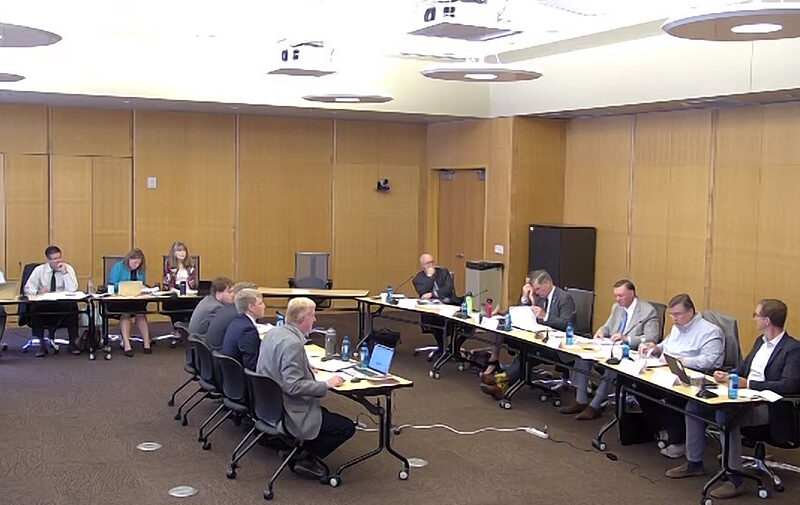Blockchain Company Offers to Develop Wyoming’s New Stable Token for $1
Wyoming officials continue working to launch a digital version of the dollar
- Published In: Politics
- Last Updated: Aug 11, 2023

The Wyoming Stable Token Commission considered possible use cases for the state’s new digital dollar at a Thursday meeting at the University of Wyoming in Laramie. (Courtesy photo from the Wyoming Stable Token Commission via Zoom)
By CJ Baker
Special to the Wyoming Truth
As the State of Wyoming works to create a digital version of the dollar on a shoestring budget, one blockchain company is offering to develop the new stable token for a dollar.
Input Output Global is “committed to bidding $1 to get this work done, and do it correctly, and make sure that we’re doing this on behalf of the people of the state,” J.J. Siler told the Wyoming Stable Token Commission Thursday.
Siler is the chief of the staff at the Wyoming-incorporated company, which is best known for creating the Cardano blockchain. The three elected officials and four subject matter experts who sit on the commission didn’t provide an immediate reaction to Input Output’s offer, though Treasurer Curt Meier checked “to make sure that price was $1.”
Unlike some stablecoin projects that have hundreds of millions of dollars at their disposal, Wyoming’s commission has $500,000. A significant chunk of that will be consumed once it hires an executive director, with a posted salary of $150,000 plus benefits.

The state launched its search for a director last month, drawing some national attention (Bloomberg noted the director is set to earn $10,000 more than the governor) and 13 applicants.
“We had … better interest than we get in our normal postings for our normal state jobs,” said State Auditor and Commissioner Kristi Racines. A subcommittee was set to discuss the candidates Thursday afternoon and eventually pick two or three to forward to the full commission.
A handful of other positions may be added in the future, and commissioners have said they may need to seek more funding from the Legislature. Ultimately, however, the stable token is intended to be a money-maker for the state.
In essence, in exchange for $1, the state will offer a digital representation of the dollar that can be used on public blockchains to, say, buy other assets or facilitate faster, cheaper payments.
While the tokens are circulating in the digital realm, the state will invest the real world dollars in short-term Treasury bills and pocket the profits. The returns could be substantial if Wyoming can grab just a fraction of the stablecoin market, which is over $125 billion and projected to grow.
The state hopes to grab market share by pitching itself as a truly trustworthy issuer. Institutions and regulators have been wary of the existing options, especially the market leader Tether, offered by a mysterious offshore company.
Choosing blockchains
First, though, the commission must sort through a host of decisions and legal issues. On Thursday, the commissioners voted to seek outside legal counsel on security laws and adopted a draft business plan; many critical sections of the plan, such as the financial projections, timeline and token’s features, remain “TBD.”
One of those items to be determined is which blockchains will host the state’s token. During the four-hour meeting, commissioners indicated they want to use multiple chains and mentioned specific interest in Ethereum. The second-largest blockchain by market capitalization, Ethereum is where most stablecoins circulate, as ERC-20 tokens.

However, Siler of Input Output discouraged the panel from going that route, providing a critique of Ethereum. He said hacks of smart contracts on the blockchain have cost users billions of dollars in recent years.
Input Output CEO (and Wyoming bison rancher) Charles Hoskinson was one of Ethereum’s founders, but left to form a new chain because “there were serious issues with how it was developed in the first place,” Siler said. Cardano has suffered no major hacks and had no downtime since its launch almost six years ago, he said, describing IO’s approach as careful and research-based.
“This doesn’t exist in Ethereum world. It doesn’t,” Siler said.
In a follow-up email to the Wyoming Truth, he said Input Output’s offer to develop Wyoming’s new stable token for $1 is meant to ensure it’s done correctly. Getting it wrong could cost Wyoming, its citizens and corporations lots of money, Siler said.
“We want this developed here, in Wyoming, in conjunction with the commission and the Legislature, to continue the growing movement of crypto development in the state,” he said. “We can’t see this developed badly in the state we call home.”
At the meeting, commissioners stressed they’ve made no decisions and want the token available on multiple chains.
“There has never been any thought about limiting the platforms available,” said Commissioner Joe Revill, the CEO of a Wyoming-chartered trust company. “And by all means, we would prefer more diversity of platforms than to limit [them].”
Fees are one factor the commission may consider. Transactions currently cost a few cents on chains like Cardano and Polygon, but can be several dollars on Ethereum (or more if the chain is congested).
Teagan Pennock, the CEO of the Wyoming firm Indico Blockchain Solutions, said fees can generally be expected to total 1% to 5% of a given transaction, prompting Commissioner Jeff Wallace to ask, “Who’s using this product?”

The CEO of Wyoming Bank & Trust noted that existing payment rails are cheaper, asking, “Why would I pay, you know, up to 7% of something to use this system to pay a bill with?”
Pennock said users could include companies that mostly deal with digital assets or individuals pursuing high-risk, high-yield strategies in decentralized finance (DeFi). In some cases, Pennock said, “you pay your 7%, and then you gain yield by investing in some risky digital assets that yield you 30%.”
Steve Lupien, the director of the University of Wyoming’s Center for Blockchain and Digital Innovation, added that stable tokens allow for programmability, which is leading to new advantages.
Potential uses
In conjunction with UW’s blockchain center, Indico Blockchain Solutions presented possible use cases for the token. They included institutional settlement and retail payments — the only uses allowed under current statute — while exploring more innovative ideas, like tokenized municipal bonds, bank deposits, money market funds and lottery tickets. Each option comes with hurdles, with some potentially drawing opposition from the Securities and Exchange Commission (SEC) or other arms of the federal government.
Still, there remained optimism about the project; Lupien said the stable token “could be one of the most transformative financial events to impact our state.”
State officials aren’t the only ones who see potential in the asset class, either: Financial technology giant PayPal announced this week that it’s launching a stablecoin.
“Obviously, PayPal is a large player in the financial services industry, and they would have entered this market with substantial research into the advantages and disadvantages,” said Commissioner Flavia Naves, former general counsel at the largest U.S.-based stablecoin issuer, Circle.
Matthew Skrlac of Indico said the state will be able to learn from how the SEC and other federal regulators react to PayPal’s new offering.
The commission’s next meeting is set for Sept. 7.













